I once lost a customer because I couldn’t make the delivery on time.
The job was simple—just a few pallets of materials for a building site. But my van was too small. I had to make two trips. That delay? It cost me the client.
That’s when I realized I needed a better hauling solution. I started looking into utility trailers.
Since then, I’ve worked with drivers, contractors, and small businesses who had the same problem I did: they needed a trailer but weren’t sure if a utility trailer was the right choice.
This article is here to help you figure that out.
You’ll learn what a utility trailer is, what it’s used for, and the kinds of jobs it can handle—whether you’re hauling equipment, transporting supplies, or making local deliveries.
By the end, you’ll have a clear understanding of how utility trailers work, what they’re good for, and whether they’ll fit the work you do.
Keep reading to learn more!
1. What Is a Utility Trailer?
Before I ever used a utility trailer, I didn’t really know what made one different from other trailers. But once I hauled my first load of tools and lumber, it all clicked.
A utility trailer is a simple, non-powered platform you attach to a vehicle. It’s used to carry items like materials, tools, small equipment, or even furniture. You don’t drive it—it doesn’t have an engine. It just rolls behind your car, truck, or SUV.
There are 2 main styles:
- Open utility trailer: Flatbed design with low or no sides. Good for hauling bulky items like timber, yard tools, or equipment that doesn’t need weather protection.
- Enclosed utility trailer: Fully covered with a roof and walls. Better for protecting tools, furniture, or anything that can’t get wet or dusty.
Choosing between the two depends on what you haul—and how often you need to protect it.
Key Features
Most utility trailers share a few core features that make them practical:
- Single or dual axles: A single axle handles lighter loads and is easier to maneuver. Dual axles are better for heavier equipment or frequent use.
- Low deck height: This means you don’t have to lift things too high when loading, which saves time and your back.
- Ramp or side gate: Great for rolling up equipment like mowers, generators, or small machines.
- Tows behind regular vehicles: You don’t need a commercial truck. Many trailers can be pulled by a basic pickup or SUV.
I’ve used my trailer for all kinds of jobs—yard work, home renovations, even helping a friend move.
So ask yourself: Do you ever run out of space in your truck or struggle to haul bulky gear?
If yes, a utility trailer might solve that problem—and save you a lot of hassle.
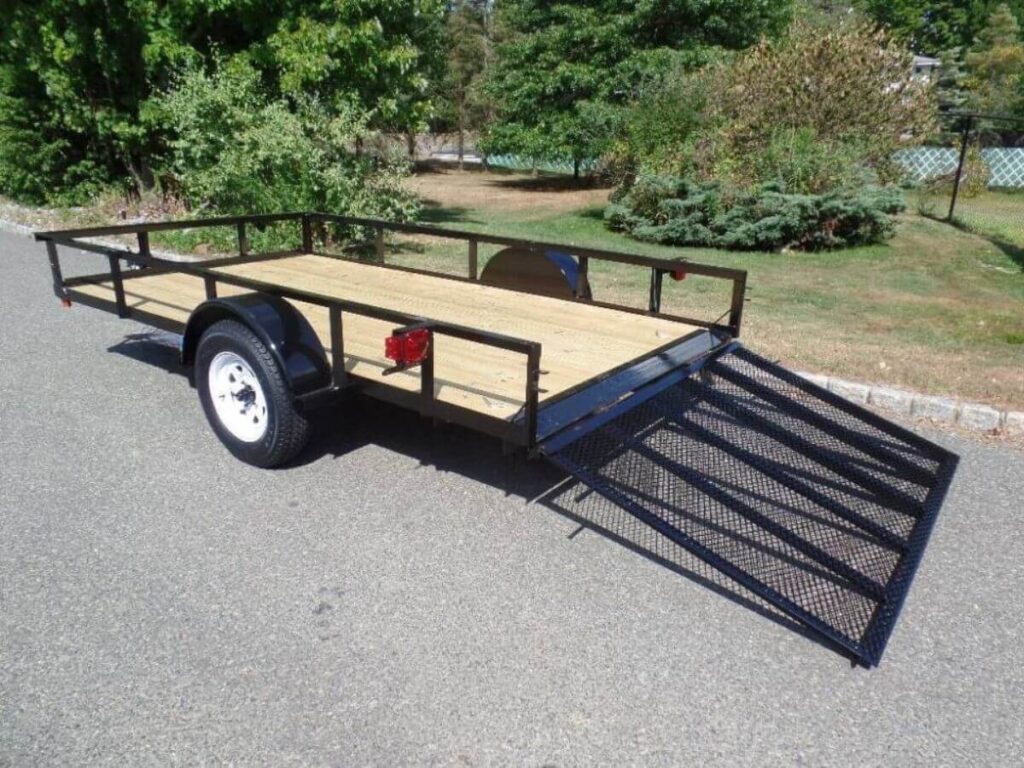
2. Benefits of Using a Utility Trailer
When you’re hauling gear, making deliveries, or moving heavy materials, space matters. I used to pile everything into my truck bed, but it wasn’t safe—or efficient. Once I started using a utility trailer, the job got easier. If you’re wondering whether it’s worth it, here are a few reasons utility trailers are one of the most useful tools you can own.
Versatility Across Industries
A utility trailer does more than just haul—it works across industries. Construction, farming, retail, or energy—it handles tools, feed, goods, and gear with ease. At Rhinotrail, we build utility trailers to fit these real-world demands. One trailer, many uses. That’s the kind of value professionals count on.
Cost-Effectiveness
If you’re on a budget, a utility trailer is a smart option. It’s much cheaper than buying a flatbed or lowbed trailer. Since it’s lightweight, it also uses less fuel when you’re towing it. And you don’t need a special vehicle—most standard pickups or SUVs can pull it. You get a lot of use without a high cost.
Easy Handling and Storage
Utility trailers are simple to use and easy to store. You can hook one up in just a few minutes. Driving with it feels comfortable, even if you’ve never towed before. When you’re not using it, you can keep it in a garage, beside your building, or at a job site. No need for extra permits or special parking. It just fits into your routine.
3. Common Types of Utility Trailers
Not all utility trailers are built the same. What works for your neighbor might not work for you. I learned that the hard way. I borrowed an enclosed trailer to move a mower—only to find I couldn’t drive it up the ramp. Since then, I’ve paid attention to trailer types and want to help you avoid the same mistake.
Each type of utility trailer is made for specific jobs. Knowing the difference helps you choose the right one from the start.
Open Utility Trailers
If you’re hauling big, bulky, or awkward items, this is the type to look at.
- No walls or roof
- Easy to load from any side
- Simple to sweep out or spray down when dirty
You’ll see these on farms, construction sites, and even in people’s driveways. They’re great for moving lumber, tools, or yard waste. I like using mine when I need quick access to gear without climbing around inside a box.
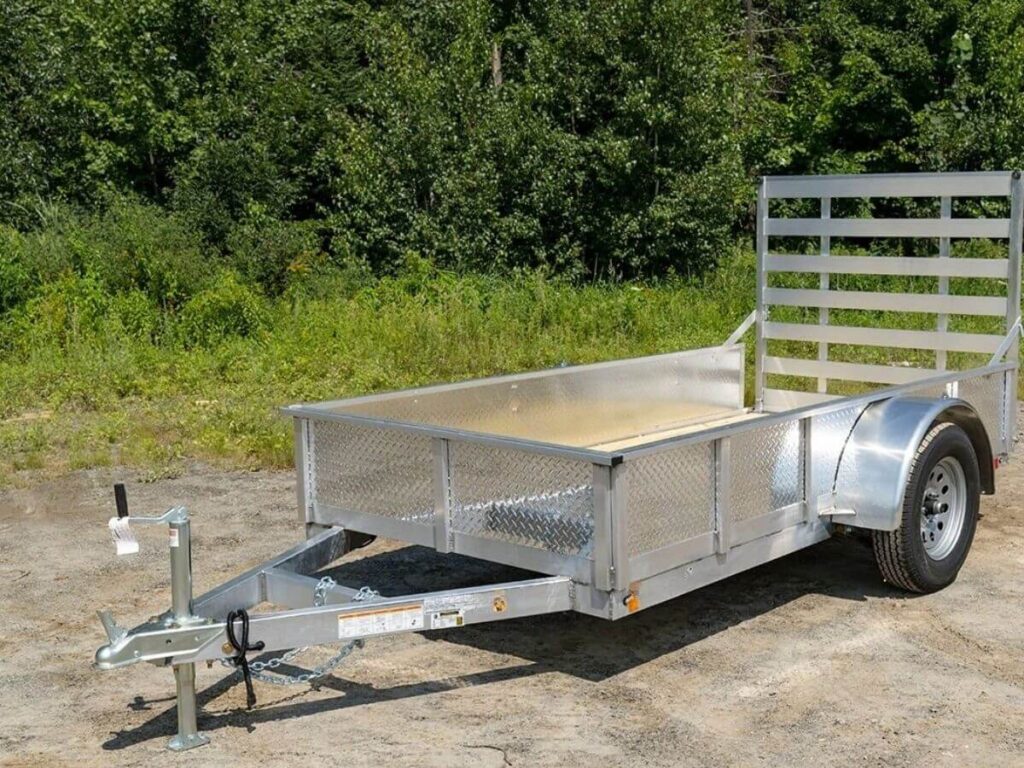
Enclosed Utility Trailers
These trailers have walls and a roof, kind of like a mobile storage unit.
- Keeps your load safe from rain, sun, or dust
- Locks up to protect against theft
- Ideal for tools, electronics, or deliveries
If you’re hauling anything that shouldn’t get wet—or you want to keep it out of sight—this is a solid option. A lot of small shops use them for deliveries and trade shows.
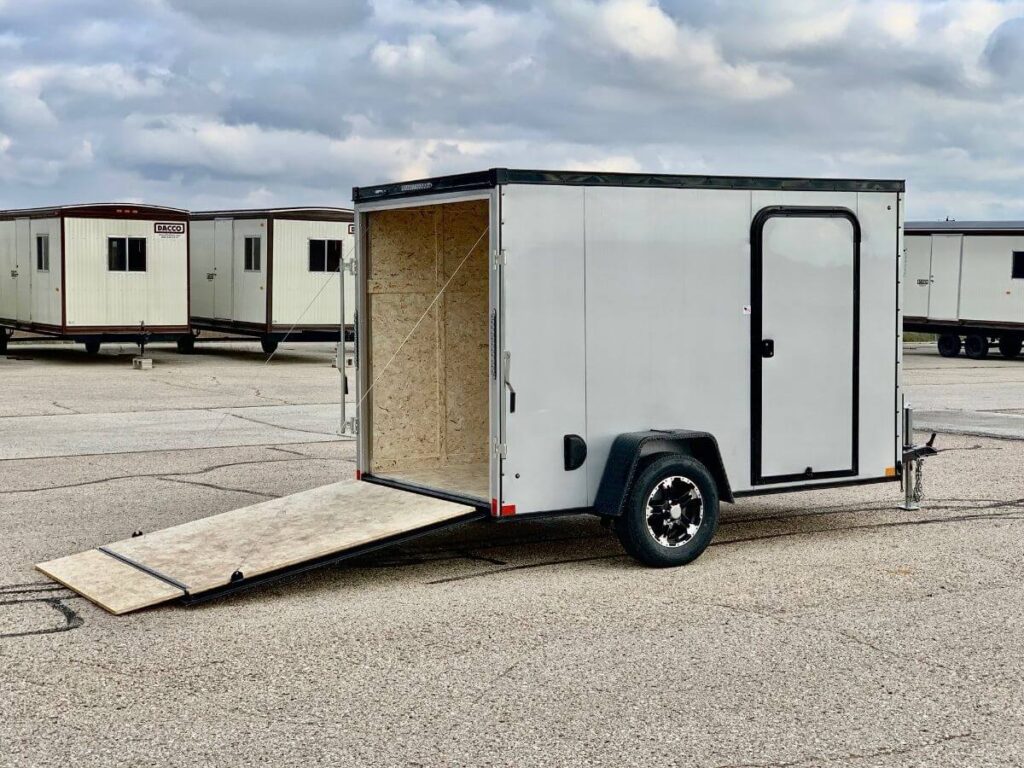
Tilt Bed Utility Trailers
Instead of using a ramp, the whole bed tilts down.
- Makes loading wheeled machines much easier
- Great for ATVs, small tractors, or power equipment
- Saves time and effort
I used one of these to load a broken-down mower that couldn’t be pushed up a regular ramp. It made the job faster and safer.
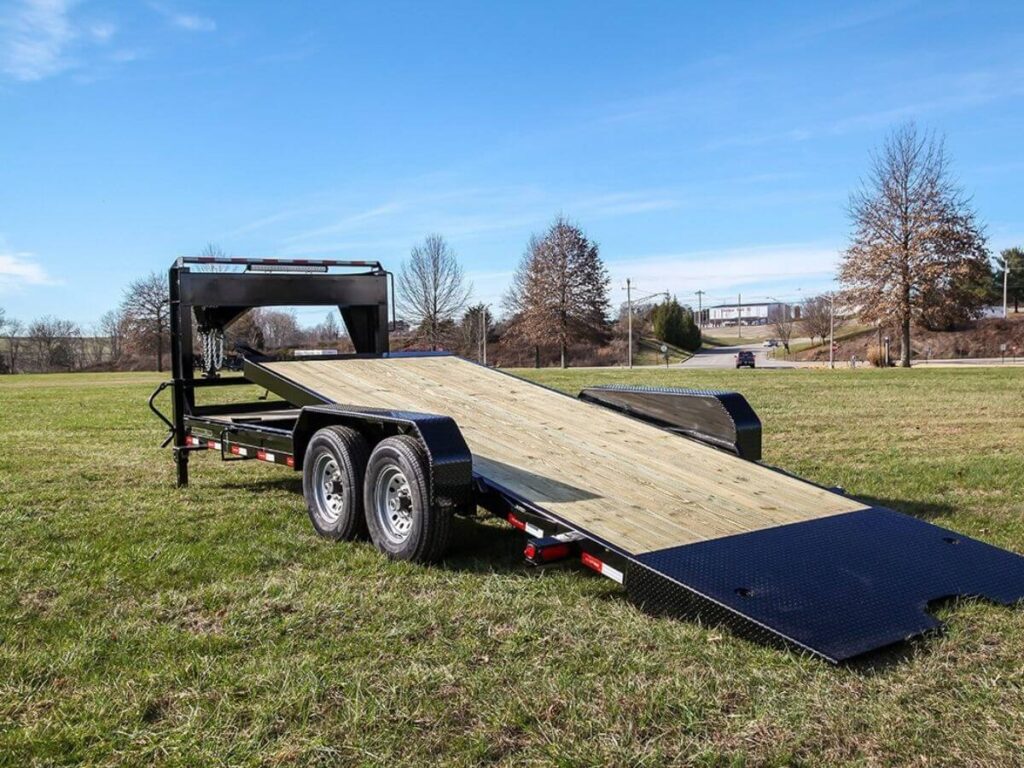
Ramp Gate Utility Trailers
This is the type I see most often with landscaping crews.
- The back gate folds down to become a ramp
- Sturdy enough for riding mowers and small equipment
- Easy to fold back up and secure when done
If you’re hauling anything with wheels, this style is a strong choice. It gives you quick access and steady support during loading.
Knowing what each trailer type offers can help you pick one that actually fits your work. And trust me—it’s better to choose the right one now than fix a bad choice later.
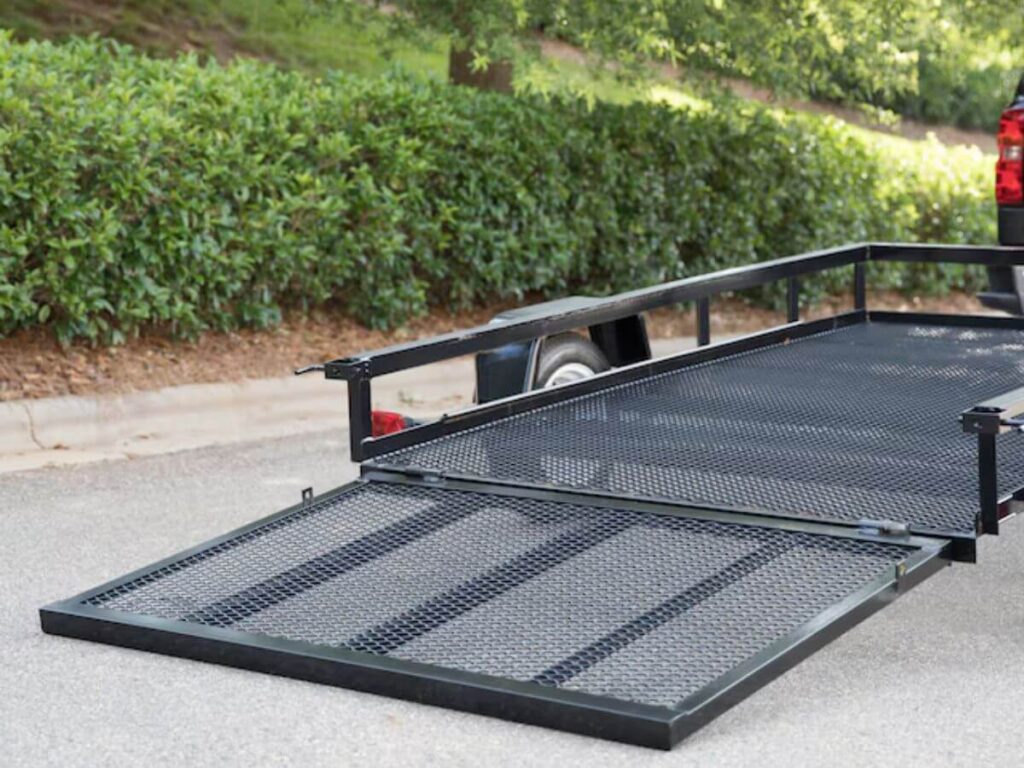
4. Popular Uses of Utility Trailers
Utility trailers aren’t just useful—they’re used every day by people in all kinds of industries. I didn’t realize how many ways you could use one until I started paying attention. Whether you’re working on a job site, hauling feed, or running a small business, a utility trailer can make your life a lot easier.
For Construction Companies
If you’re in construction, you probably move equipment from site to site. A utility trailer helps you carry:
- Power tools
- Generators
- Compressors
- Small machines like cement mixers
You can load everything up in one go and save time on daily trips. I’ve seen crews use them as mobile tool stations, parked right beside the build.
For Agriculture & Food Industries
Farms use utility trailers all the time. You might use one to:
- Haul bags of feed or seed
- Move fencing materials
- Transport small livestock or poultry
- Carry seasonal crops to storage or market
One farmer I spoke with uses an open trailer during harvest to move bins of vegetables. It saves multiple trips across the property.
For Logistics & Retail
If you work in local delivery or retail, a utility trailer can be part of your daily routine.
- Last-mile delivery (getting goods to the final customer)
- Moving trade show booths or displays
- Restocking items between locations
Enclosed trailers are especially helpful here. You can protect goods from weather and keep things secure when parked.
For Individual Buyers
You don’t need to run a business to use a utility trailer.
I’ve used mine for:
- Hauling soil and mulch for landscaping
- Weekend cleanups and dump runs
- Moving furniture
- Helping friends with small loads
If you’re into DIY projects or run a side business, a trailer gives you more freedom to haul what you need—without renting a truck.
Whatever kind of work you do, there’s a good chance a utility trailer can help. And once you start using one, you’ll wonder how you managed without it.
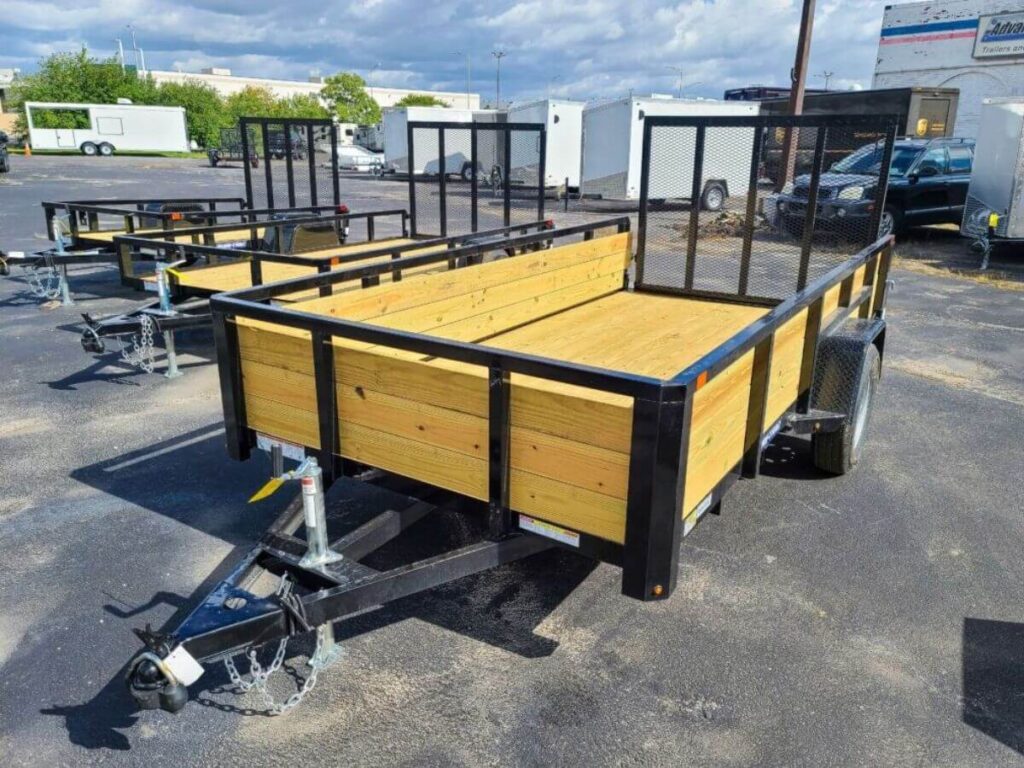
5. Specialized Applications of Utility Trailers
I used to think utility trailers were just for simple jobs—hauling wood, yard waste, or maybe some tools. But after visiting a mining site a few years back, I saw one being used to move safety gear deep into the work zone. That changed how I saw things.
Since then, I’ve noticed how many industrial sites rely on utility trailers in ways you wouldn’t expect. If you work in mining, energy, or manufacturing, there’s a good chance a utility trailer is already part of your daily routine—or could be. And it’s usually doing more than people give it credit for.
For Mining Operations
In mine zones, you need equipment that’s simple, strong, and easy to move around.
Utility trailers are often used to:
- Haul safety gear to different zones
- Carry tools for on-site repairs
- Move parts between workshops and rigs
For Oil, Gas, and Energy
These jobs usually happen in wide, open spaces. Pipelines, wind turbines, and field stations are rarely close together.
A utility trailer helps carry:
- Portable tanks and fuel cans
- Toolboxes and service kits
- Emergency repair parts
Rough terrain is common here. That’s why heavier-duty utility trailers with stronger axles and good tires are often used.
For Industrial/Manufacturing Use
In large factories or industrial parks, people often forget how much back-and-forth happens every day.
You can use a trailer for:
- Move raw materials from storage to production
- Haul heavy tools between work areas
- Carry machine parts between buildings
If your job site covers a lot of ground—or you just need a simple way to move gear—don’t overlook what a utility trailer can do. It might be the most helpful tool you didn’t know you needed.
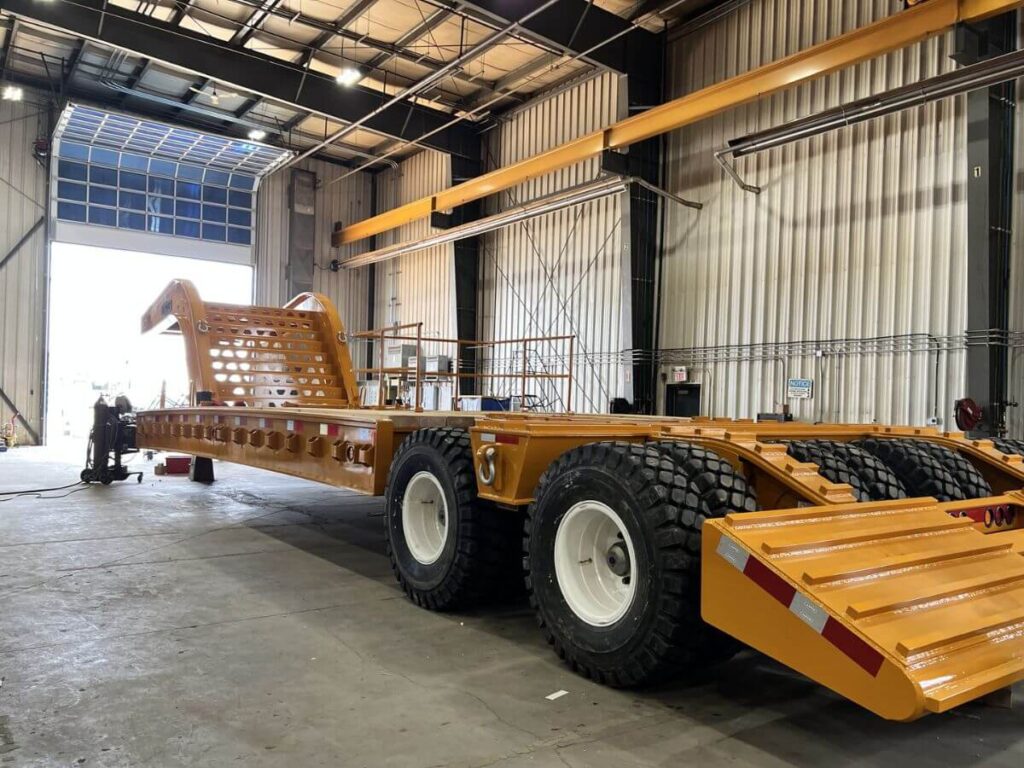
6. Comparing Utility Trailers to Other Trailer Types
If you’re trying to figure out whether a utility trailer is the right option for you, it helps to compare it with other common trailer types. Each one is built for a different kind of job. Some are better for heavy-duty hauling. Others are built for simple, everyday use.
| Feature | Utility Trailer | Flatbed Trailer | Dump Trailer | Low-Bed Trailer |
| What It’s Best For | General hauling, tools, yard work, light equipment | Large or wide items like steel, lumber, heavy gear | Loose materials like gravel, soil, debris | Oversized machines like excavators, bulldozers |
| Design | Open or enclosed, has sides or ramps | Completely flat, no sides or roof | Enclosed or open with hydraulic dumping system | Very low deck, built for high clearance equipment |
| Load Type | Small to medium loads | Large and bulky items | Loose, heavy materials | Oversized or very heavy industrial equipment |
| Weight Capacity | Light to medium (varies by axle) | Medium to heavy | Medium to heavy | Very heavy (up to 80,000 lbs or more) |
| Towing Vehicle Needed | Pickup truck or SUV | Heavy-duty truck | Pickup or heavy-duty truck | Tractor or special hauler |
| Ease of Use | Very easy—simple hitch, light frame | Requires more space and skill to tow | Heavier and harder to back up | Needs trained operator, special permits in some cases |
| Cost Range | Low to moderate | Moderate to high | High (due to hydraulics and weight) | Very high (specialized use) |
| Loading Method | Manual loading, ramp gate, or tilt bed | Forklift or crane often needed | Tilt bed unloads automatically | Requires ramps, crane, or dock |
| Storage | Fits in garage, yard, or work site | Requires more space | Takes up space and may need a flat surface | Needs large storage area, not ideal for small properties |
| Maintenance | Simple—check tires, hitch, lights | Tires, tie-downs, frame checks | Hydraulic system requires more upkeep | Heavy-duty parts and tires require skilled service |
7. Maintenance and Safety Tips for Utility Trailers
If you’re using a utility trailer regularly, a little upkeep can save you from big problems. Let’s look at some simple ways to keep your trailer safe and in good shape.
Routine Checks
Before each trip, give your trailer a quick once-over. It only takes a few minutes and can prevent costly damage.
Check the following:
- Tire pressure: Low tires can cause blowouts or uneven wear.
- Hitch connection: Make sure the coupler is locked and secure.
- Brake and signal lights: Test all lights to make sure they’re working.
- Straps and tie-downs: Look for frays, weak hooks, or missing pieces.
I carry an extra set of straps in the truck, just in case. It’s saved me more than once.
Safe Towing Practices
Even if your trailer is in great shape, how you tow it matters.
Here are some tips to keep your trip smooth and safe:
- Know your trailer’s load capacity and never go over it.
- Use the right hitch and towing vehicle for your trailer’s weight.
- Distribute the load evenly—don’t pile everything at the back.
- Keep your speed in check. A loaded trailer needs more stopping distance.
I once overloaded the rear and felt the trailer sway at 60 mph. I got lucky, but now I always double-check weight balance.
Storage and Protection
Taking care of your trailer doesn’t stop when it’s parked.
To keep it in good condition:
- Cover it when not in use, especially if it sits outside.
- Lubricate axles and bearings every few months to avoid rust and wear.
- Store it on level ground to protect tires and frame.
Good maintenance makes your trailer last longer—and keeps you safer on the road. It’s worth the time.
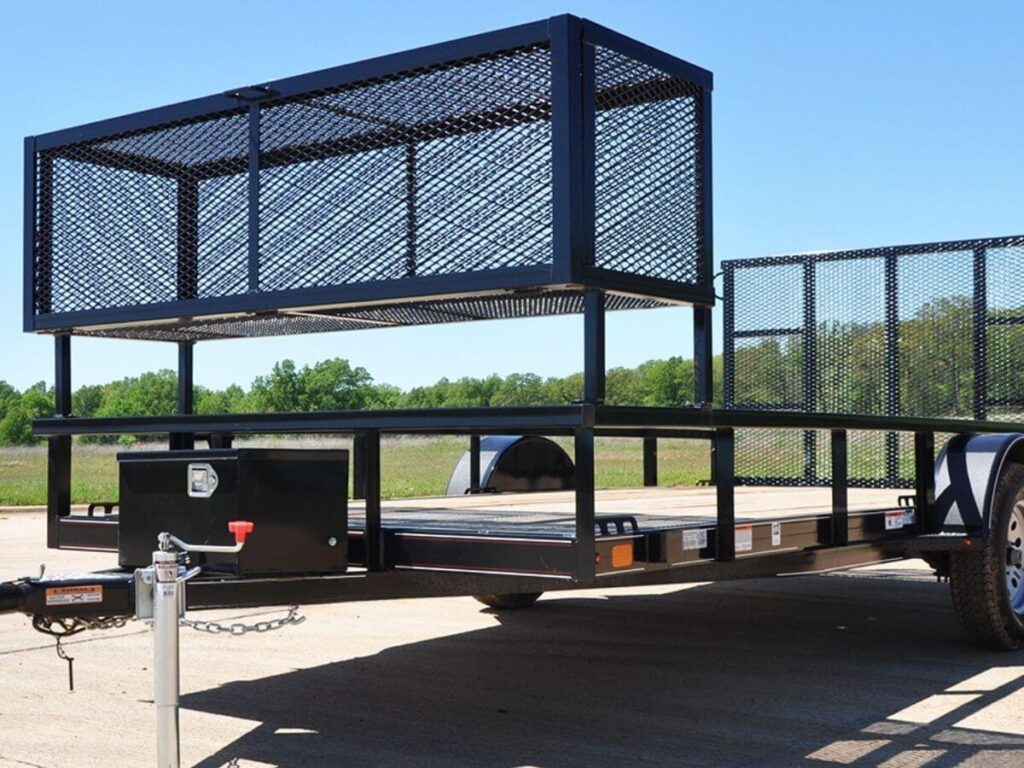
8. Key Factors to Consider Before Choosing a Utility Trailer
Choosing the right utility trailer isn’t just about picking the one that looks good or fits your budget. I’ve made that mistake before—bought a trailer that looked sturdy but didn’t match the weight I needed to haul. It sat in my yard more than it helped me. If you want a trailer that actually works for your kind of job, here are the key things to think about first.
#1 Payload Capacity
Before anything else, think about how much weight you’ll be hauling. Payload is the total weight your trailer can carry—not counting the trailer itself. If you haul too much, you can damage the axle, wear out your tires, or lose control on the road. I once overloaded mine with landscaping stones, and it was a stressful ride. Always check the trailer’s weight rating and match it to your typical load.
#2 Trailer Size and Dimensions
The size of your trailer should fit the items you move most often. But size isn’t just about the cargo. You also need to think about where you’ll park or store the trailer. I’ve had to leave mine outside before because it wouldn’t fit in the garage—something I wish I had considered earlier. At Rhinotrail, we produce utility trailers in a range of sizes to match both your hauling needs and your available storage space.
#3 Enclosed vs Open
Enclosed trailers protect your cargo from rain, dust, and theft. They’re great if you’re hauling tools, supplies, or anything you need to keep safe. Open trailers are easier to load, especially for bulky or odd-shaped items. I like using open trailers for quick jobs—less hassle, faster access. But if you need security or weather protection, go enclosed.
#4 Axle Count and Suspension
Single-axle trailers are good for light loads and short trips. They’re easier to turn and store. Tandem-axle trailers, which have two axles, are better for heavier loads and rougher roads. They offer better balance and smoother towing. If you’re hauling every day or dealing with bumpy job sites, go tandem. Otherwise, a single axle may be enough.
#5 Legal Requirements
Every area has its own rules. Some trailers need license plates. Others must have working lights, reflectors, or brakes. These rules often depend on weight and size. It’s not the most exciting part of the process, but it matters. I’ve seen folks get stopped and fined for something as small as a missing light. Always check local laws before you hit the road.
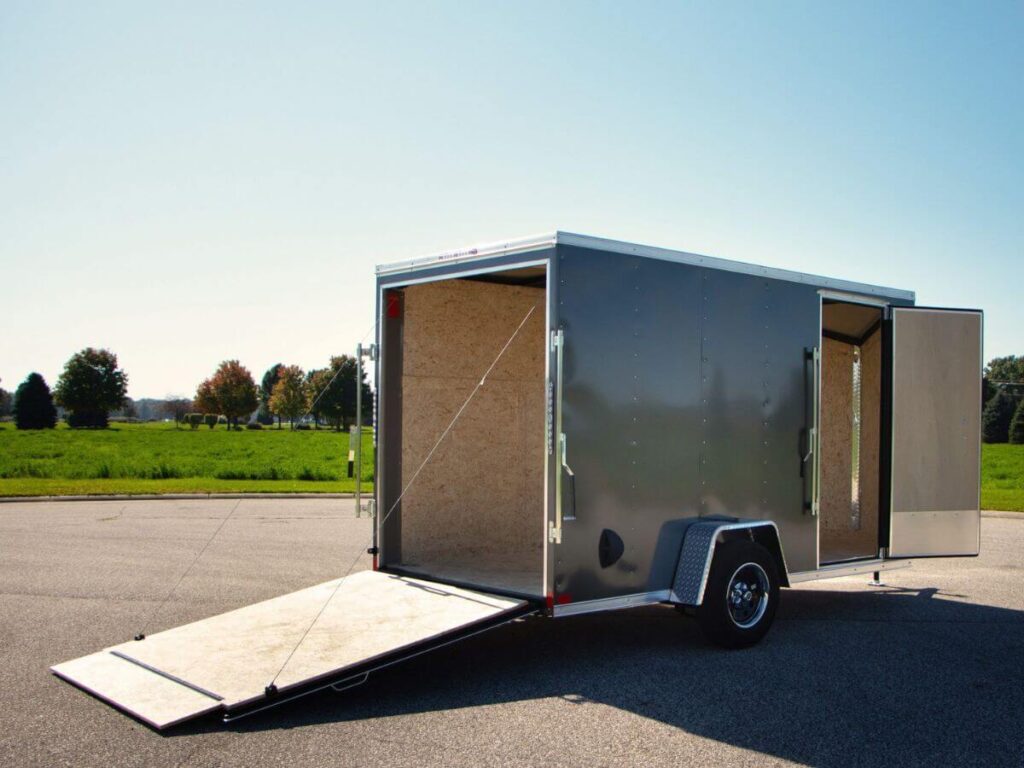
Conclusion
A utility trailer won’t do the work for you—but it will make the hard jobs feel easier.
We’ve walked through the types, uses, safety tips, and how to choose one. You know what they’re for, how they’re built, and why they matter.
If you’re still hauling in the back of a truck, it might be time to change that.
What’s your main struggle right now—storage, hauling, or choosing the right size?
You don’t have to figure it out alone.
Contact us today and let’s find the trailer that works for you.


